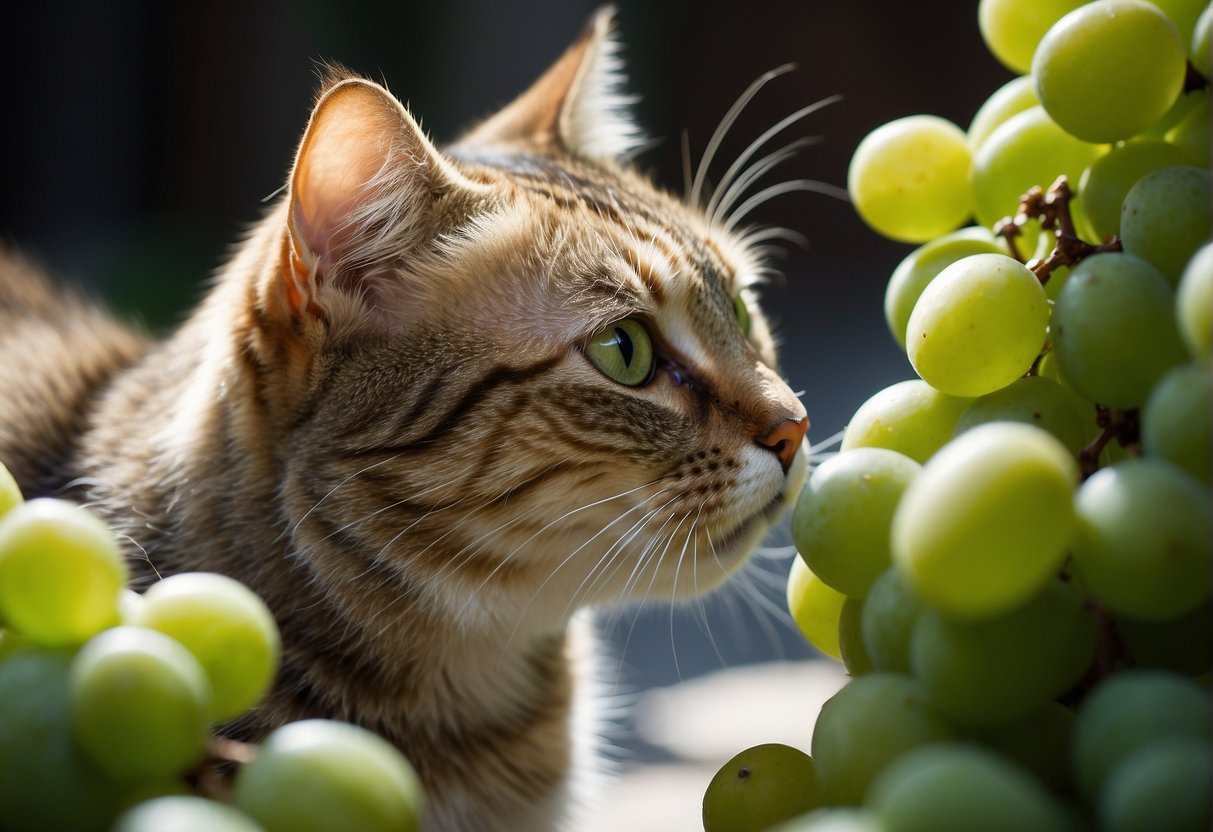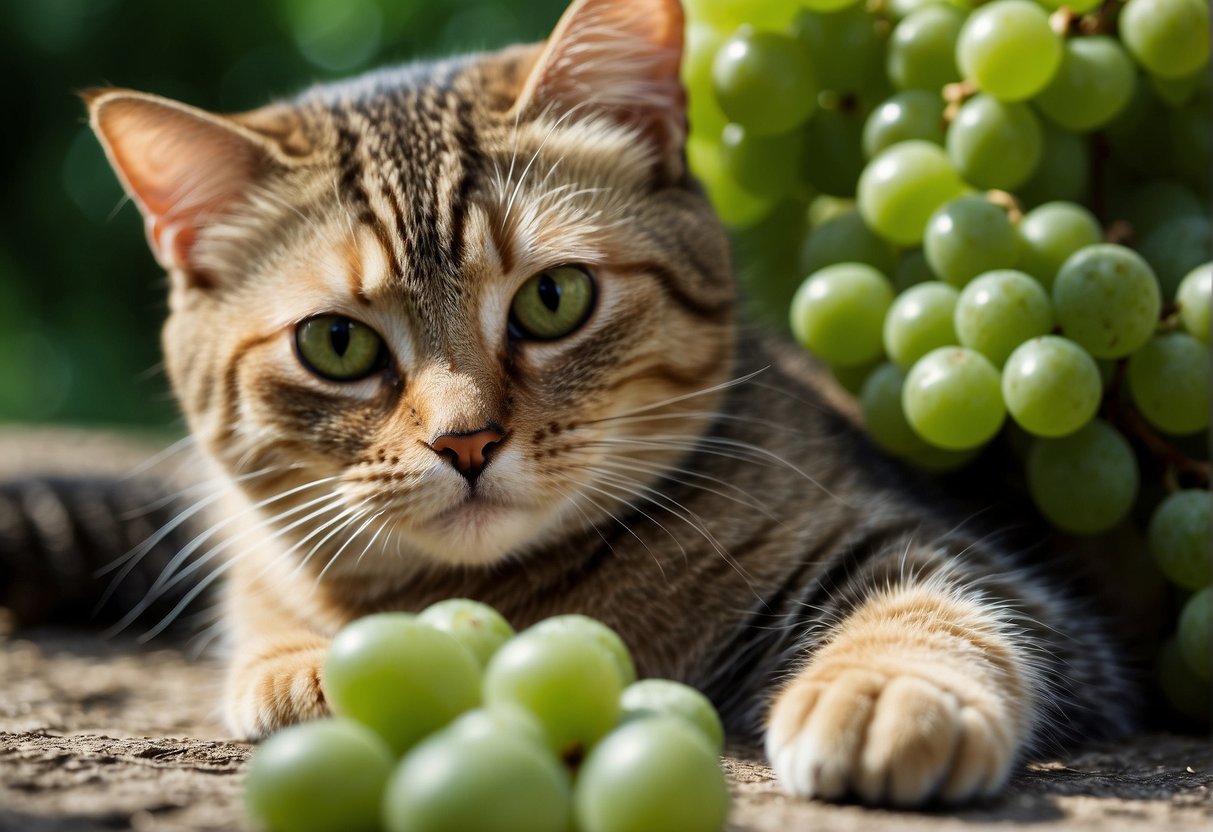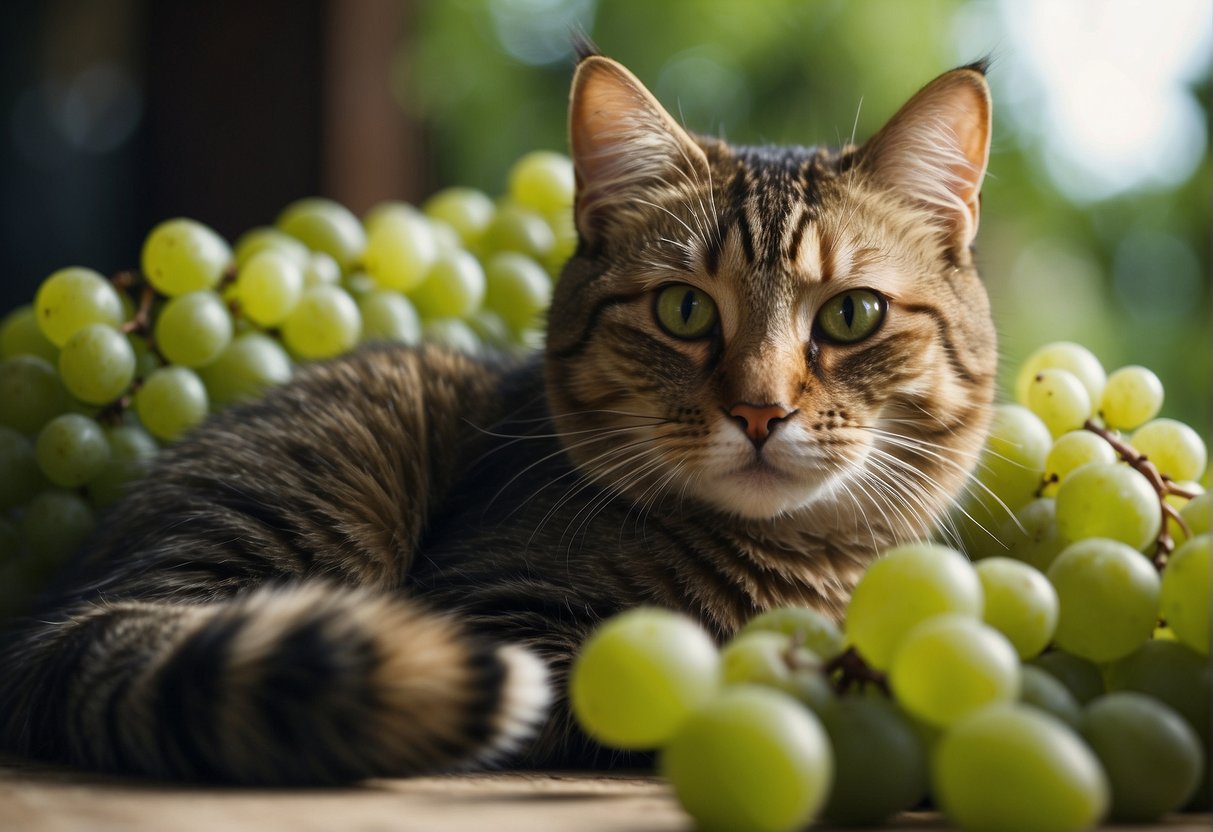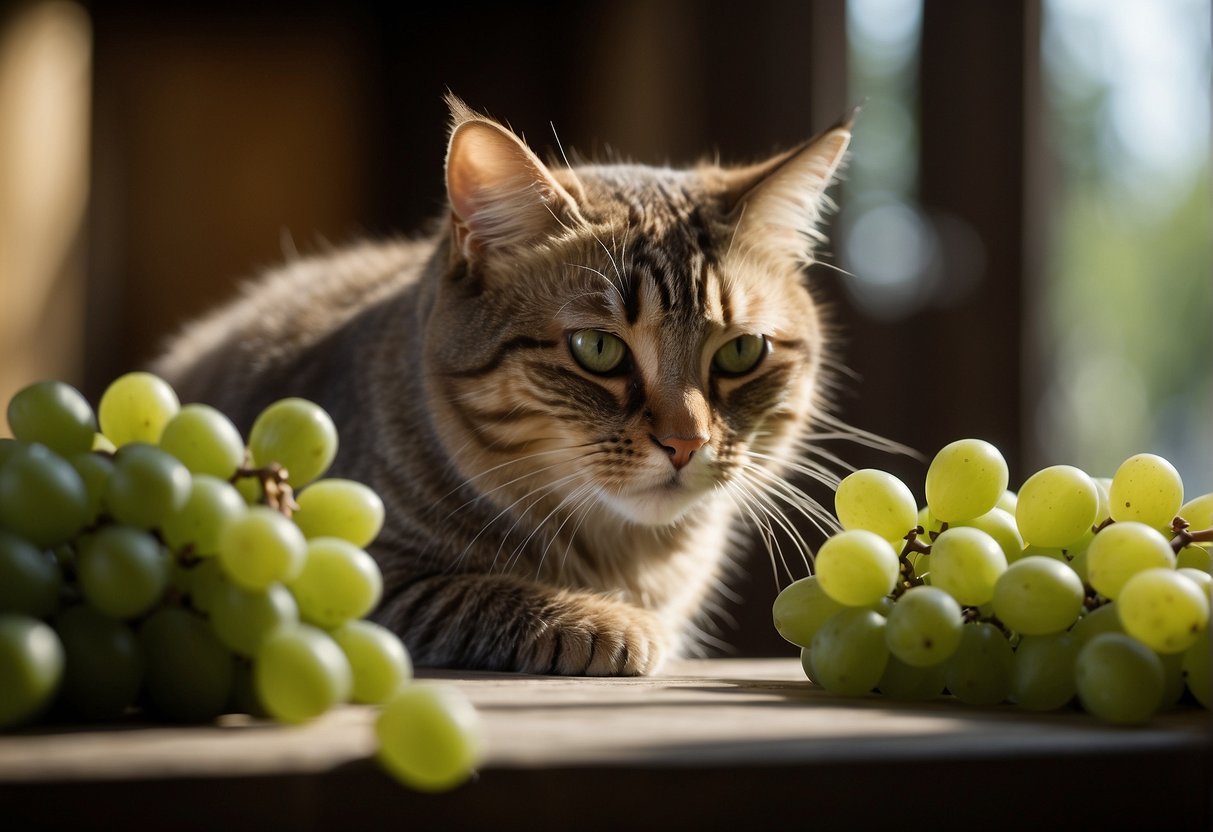Wondering if that bowl of juicy green grapes on your kitchen countertop or kitchen table is safe to share with your feline friend?
You’ve probably heard that some human foods can be a no-go for pets, and it’s always best to double-check before offering a tasty treat.
Cats are obligate carnivores, which means their diet should primarily consist of meat.
However, as a diligent pet owner, you acknowledge the importance of understanding which foods are safe and which could be harmful, including the bowl of snack on the kitchen countertop or in the cupboard.
While green grapes might seem less harmful compared to red or purple grapes, they are not necessarily safe for cats.
The substances present in green grapes can still pose a risk of acute kidney injury for cats, which is a significant health concern.

As tempting as it may be to let your kitty sample everything you eat, caution is key when it comes to their diet. Not all human food is created equal in the world of cat nutrition.
While cats may not show the same interest in fruits like we do, the question arises: can green grapes be an exception for cat owners? Or does the possibility of grape toxicity make it a risk not worth taking?
It’s critical for cat owners to be informed about potential dangers food to their pets , and strawberries are a food that deserves particular attention.
Cats lack sweet taste receptors, so they do not enjoy the sweetness of fruits, including green grapes, in the same way we do.
Key Takeaways
- Cats’ diets should focus on meat, but knowing safe human food options is essential.
- Green grapes may carry a risk of toxicity for cats, although some may eat them without immediate issues.
- It’s prudent to consult the Pet Poison Helpline or a veterinarian before offering grapes to cats.
Can Cats Eat Grapes? Understanding the Basics
Overview of Grape Toxicity in Cats
Have you ever wondered if sharing a grape with your furry friend is okay? Well, here’s the deal: grapes are a no-go for cats.
Veterinary science has put its foot down on this. Grapes, and their dried counterparts, raisins, can cause some serious issues.
We’re talking toxicosis which can lead to kidney failure—a scary thought, right?
It’s surprising because it’s not clear why grapes are toxic to cats or which part of the grape the toxin comes from, but what’s known is that it doesn’t take much, it’s better to choose other safe fruit snacks for your cat.
Even a small serving of grapes can make a cat ill, so it’s best for pet parents to keep your stash of raisins well out of your cat’s way.
Symptoms of Grape Poisoning in Cats
So, your cat sneaks a grape—what might happen next?
Symptoms of grape toxicity in cats, including the first symptoms of toxicity, can range from vomiting to extreme lethargy, and in severe cases, acute kidney failure, which is a very serious condition. (1)
Imagine a cat named Whiskers who ate about 12 grapes—Whiskers may start to act weirdly sluggish, maybe even refuse his favorite tuna treat, and that’s when alarm bells should ring.
Especially if he starts experiencing weakness or tremors indicating the first symptoms of toxicity, a very serious condition that requires immediate professional help.
Treatment Options for Grape Toxicity
So, your cat sneaks a grape—what might happen next?
Symptoms can range from vomiting to extreme lethargy, and in severe cases, acute kidney failure.
Imagine a cat named Whiskers who ate about 12 grapes—Whiskers may start to act weirdly sluggish, maybe even refuse his favorite tuna treat, and that’s when alarm bells should ring, especially if he starts experiencing weakness or tremors.
Remember, you’re the gatekeeper of your cat’s diet, so keep those grapes out of paw’s reach!
Green Grapes and Cats: A Specific Inquiry
Are Green Grapes Safe for Cats?
Have you ever snacked on green grapes and wondered if your feline friend could enjoy them too?
Well, it’s important to note that green grapes, while a refreshing treat for you, aren’t a safe snack for kitties. But how do they compare to their red or black counterparts in toxicity?
Green grapes might be considered less toxic than red or purple grapes, but this doesn’t mean they’re safe.
They still contain substances that can lead to acute kidney injury in cats, which is a serious health concern.
Although there aren’t extensive studies that single out green grapes, the general consensus among veterinarians is to keep all types of grapes away from cats.
Don’t let the seemingly harmless nature of a green grape fool you—it’s not worth the risk.
Nutritional Aspects of Green Grapes
You might think that since grapes are packed with nutrients, they must be good for your cat, right? But here’s the scoop on that.
| Nutrients in Green Grapes | Cats’ Nutritional Needs |
| Natural Sugars | Low need for carbohydrates |
| Vitamin C | Produced by cats’ bodies |
| Vitamin K | Not essential in high amounts |
| Water Content | Beneficial but available from other sources |
Despite the hydration green grapes can offer, the cons outweigh the pros. Cats metabolize foods differently than humans, and their bodies simply don’t need the extras that grapes provide.
They have their own dietary requirements, which green grapes don’t meet, and the potential health risks make this fruit a no-go zone for your purring pal.
Remember, when in doubt, keep it out—of your cat’s diet, that is!
Prevention and Safety Measures

When it comes to keeping your feline friend safe, prevention is key, especially concerning their diet!
Did you know that grapes, including green grapes, can pose serious health risks to cats?
It’s important to take precautionary steps to prevent accidental ingestion in the first place.
What Should You Do?
- Keep Grapes Out of Reach:
Store grapes well out of paws’ reach, ideally in a closed container or refrigerator. - Educate Your Household:
Ensure everyone in your home is aware that grapes are a no-no for kitty consumption.
Remember, even small amounts of grapes can be harmful. If you suspect your cat has snuck a grape, it’s a vet visit ASAP kind of day. Better safe than sorry, right?
Safe Alternatives to Grapes for Cats
Curious about what treats are safe for your purr-pal? Check out these feline-friendly snacks:
- Cooked Meat (chicken or turkey): High in protein, feed in small, bite-size pieces.
- Cantaloupe: A good source of antioxidants, offer a small cube occasionally. (2)
- Blueberries: Packed with vitamins, a few berries are enough for a treat.
- Carrots: Cooked and cut into small chunks, these are great for a vitamin boost.
These snacks not only tickle the taste buds but also provide a nutritional punch!
Exploring safe cat treats beyond the traditional choices ensures that your feline companion enjoys a variety of tastes without the risks associated with grapes or other potentially harmful foods.
Guidelines for Introducing New Foods to Cats
Is it time to jazz up the menu for your furry companion? Here’s how to safely introduce new foods:
- Consult Your Vet: Always check with your vet before making any diet changes.
- Go Slow: Introduce any new food gradually to avoid upsetting their tummy.
- Tiny Portions: Start with a small amount to see how your cat reacts.
- Monitor Closely: Keep an eye out for any odd behavior or adverse reactions.
- Adjust as Needed: If your cat’s a fan and there’s no bad reaction, congrats! You’ve just expanded their culinary world.
A bit of caution and care can ensure your cat’s diet is both safe and exciting!
Expert Insights and Recommendations

Veterinarian Advice on Cats and Grapes
Ever wondered if those plump green grapes on your table are a safe treat for your cat?
Well, the consensus among vets is a resounding no.
“Cats and grapes is a no-go,” says Dr. Whiskers, a feline nutrition expert. Grapes, regardless of their color — green, red, or purple — can be toxic to cats. (3)
The exact substance causing the toxicity is still a mystery, but the effects, ranging from vomiting to potentially fatal kidney failure, are well-documented.
So, it’s safe to say those grapes should stay strictly in your bowl.
Research Findings on Grape Toxicity in Cats
But don’t just take my word for it; let’s peek into some published figures. Science has backed up these vet recommendations with numbers.
Research pegs the toxic threshold at astoundingly low levels. It’s been estimated that just 12 grapes could potentially lead to poisoning in a ten-pound furball.
And raisins? Even more dangerous. Roughly 30 raisins could spell trouble given their concentrated nature.
These aren’t just cautionary numbers; they’re alarms signaling to keep that grapevine far out of paw’s reach.
In cases of grape toxicity, veterinarians may administer a dose of activated charcoal, which acts like a magnet that attracts toxic substances and carries them through the gastrointestinal tract and out of the body.
If you know or suspect that your cat has eaten grapes or raisins, call your veterinarian or the ASPCA Animal Poison Control Center (888-426-4435), the authority on pet poisonings, immediately. (4)
You don’t need to wait until you see clinical signs to seek help. Grape toxicosis is a progressive illness, so the sooner you treat it, the better.
Remember, your feline’s health isn’t worth the risk for a grape’s momentary delight. Stick to cat-safe treats and foods, and when in doubt, the safest way is to make a quick call to your vet can clear the air.
Keep those grapes fenced off in your fridge, and let your cat indulge in snacks vet-approved for a purr-fectly healthy life after a shopping bags trip.
Quick Recap

Have you been pondering whether your feline friend can nibble on green grapes?
Let’s break it down real quick. Grapes, both green and red, are tempting human snacks loaded with antioxidants, vitamins, and minerals.
But when it comes to your cat, it’s not so straightforward.
Grape Toxicity:
It’s known that grapes can be toxic to cats. Eating just a few can lead to serious health issues.
To put it into perspective, for a cat that weighs around 10 pounds, consumption of as few as 12 grapes could potentially cause illness.
Raisin Risk:
Similarly, watch out for raisins (dried grapes), where as little as 30 raisins could be harmful for your pet of the same weight.
Symptoms of Grape Toxicity:
- Vomiting
- Diarrhea
- Lethargy
Safer Alternatives:
While some suggest that small pieces of grape might not pose immediate harm, why take the risk when there are safer treat options available for your cat?
Concerned or curious? Always remember the golden rule: When in doubt, reach out to your vet. Your vet is your go-to for personalized advice on your cat’s diet.
So, let’s keep it simple and stick to the no-grape motto for your kitty’s sake. It’s better to be safe than sorry, right?
Your curious cat can thank you later for steering clear of these potentially harmful fruits!
Frequently Asked Questions
When it comes to our furry friends, we want to ensure their safety and health are top priorities, so let’s get straight to the point about cats and their relationship with grapes.
Can kittens eat grapes or grape products?
Absolutely not. Your curious kitten should steer clear of grapes and grape products just as an adult cat should.
Ingesting grapes can lead to potentially life-threatening toxicity, regardless of your cat’s age or health.
Are organic grapes safer for cats than non-organic grapes?
Organic or not, grapes are a no-go.
The toxicity of grapes to cats doesn’t stem from pesticides or farming practices; rather, it’s something innate to the grapes themselves that can cause harm to your feline friend.
Can grapes cause long-term health issues in cats?
Yes, they can. Eating grapes can lead to kidney damage and even failure, which is a serious long-term health issue for cats. It’s best to avoid feeding grapes to your cat entirely.
How quickly do symptoms of grape poisoning appear in cats?
Symptoms can arise in as little as 24 hours after consumption. If you suspect your cat has snacked on grapes, time is of the essence. watching out for signs of distress like vomiting, lethargy, or diarrhea, and contact your vet immediately.
Are grape-derived products like raisins or wine also harmful to cats?
Yes, indeed. Raisins are just dried grapes, and they pack the same toxic punch in a smaller package. Wine and other grape-derived products are also a big no for your cat’s consumption, due to the same toxic principles found in grapes.
Is there any safe quantity of grapes for cats?
No safe amount has been established, so it’s best to err on the side of caution and avoid giving your cat any grapes at all. Even a small nibble could be enough to cause illness in some cats. Stick to cat-safe treats instead!
- Where to find the most trustworthy real money casinos - August 7, 2025
- Online Casinos That Approve PayPal: The Ultimate Overview - August 7, 2025

